It's always a spectacular when a new
Quentin Tarantino film rides into theaters. The writer and director
has been well-known for his hyper-intelligent dialogue and rampant
violence since the 1992 release of his debut film Reservoir Dogs.
Since then, the former video store clerk and self-proclaimed film
geek has put together an acclaimed and eclectic body of work which
includes Pulp Fiction, Jackie Brown, Kill Bill, Death
Proof, Inglourious Basterds and Django Unchained. As a
screenwriter only, he also did True Romance, From Dusk Till Dawn
and Natural Born Killers.
Hot on the heels of Django Unchained
(well, three years later, but that is a normal turnaround time for a
Tarantino film), the director has decided to do his second straight
old-school western film. However, The Hateful Eight is very
different in content and style than the colorful and flashily-violent
Django. Instead, Hateful is almost like an old parlor mystery
transferred to the rugged old west.
The great majority of the action takes place
in a single saloon, where a bounty hunter (played by Kurt Russell) and
his captured prey (Jennifer Jason Leigh) encounter a group of strangers
(including Walton Goggins, Bruce Dern, DemiŠn Bichir, Tim Roth, Michael
Madsen and Samuel L. Jackson), all of whom have mysterious backgrounds
and agendas. It leads to an intense standoff between characters, with
bloody consequences.
Tarantino, who is a huge proponent of film
over digital technology, also has decided to film The Hateful Eight
in 70mm. This has lead to a limited release "road show," an
old-fashioned movie-going experience in which the film will play in
classic old movie houses around the country (which are still equipped to
show film), complete with an opening overture, additional scenes and an
intermission.
A couple of weeks before The Hateful Eight
starts its limited 70mm release in theaters (spreading wide a week
later), the writer/director and most of the staff held a press
conference to discuss the film at the legendary Waldorf-Astoria Hotel in
New York. As we sat in the crowded conference room, we weren't surprised
to find the avuncular filmmaker taking the lead, but everyone had
interesting things to say about the movie and working with Tarantino.
Quentin Tarantino:
Thanks for coming out everybody! That traffic
was hell. Everyoneís been telling me about bricks raining down on New
Yorkers over the last couple of days.
Bruce Dern:
I quite like the rain actually, it never rains in California.
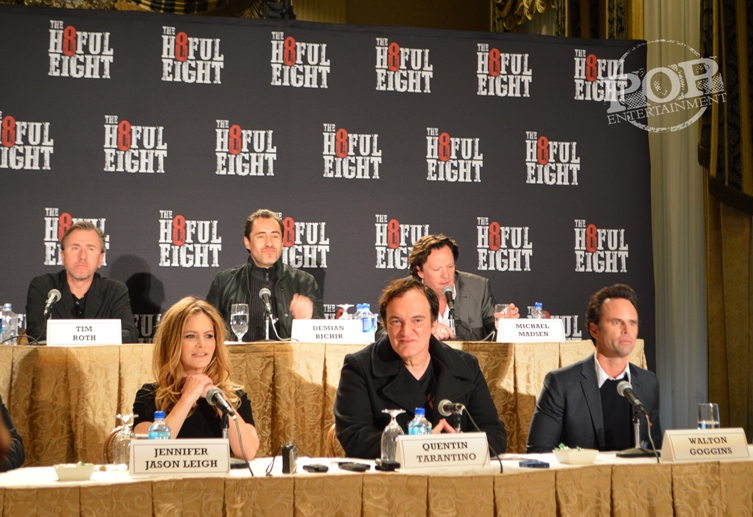 Tell
us about the road show.
Tell
us about the road show.
Quentin Tarantino:
The road show opens on December 25th. Itíll go for two weeks. Weíll lose
some of the screens after second week, but weíll keep some of them. Be
exclusive for one week starting December 25th and we open wide on the
31st, but weíll keep the 70mm projection going on. The Weinsteins
(ed. note: Harvey and Bob, the
owners of the studio releasing the film) have just done an amazing
thing. Just to put it in perspective, Warner Brothers threw their entire
weight behind Christopher Nolan when he did Interstellar.
Nevertheless they only played in about 11 venues in the course of his
70mm run. We are playing in 44 markets in 100 theaters with our road
show.
Not only that, they literally are some of the
biggest, nicest movie palaces still left. Like The Music Box in Chicago,
The Hollywood Theater in Portland... Iím spacing right now... the Fox
Theater in Detroit, the Cinerama Dome for two weeks in Los Angeles. Itís
just really wonderful. All the places that have 70mm capabilities, we
utilize them. Other places we just moved the screens in and created it.
I remember talking about it when we first had
a discussion. It was like: Look, we should be like Neil Diamond coming
into town. Or we should be like Book of Mormon. We go into big
venues. Maybe they donít even show movies anymore, but weíll set up our
big screen and weíll set up our projectors and weíll let it rip. It has
been a Herculean effort and they pulled it off. We are screening in a
hundred theaters between US and Canada, Iím very, very proud. The
advanced tickets go on sale today.
There you go, you get your moneyís worth. It
is a hell of a night or afternoon at the movies. So talk to me a little
about...
Quentin Tarantino:
One thing I want to show actually before we
move off of that. Weíre trying to do this like the old-school road
shows. When we think of movies like Lawrence of Arabia or
Ryanís Daughter, weíve all probably seen the regular release
version. The road shows had an overture. They had an intermission. They
were a little longer. Ours is about seven minutes longer, just for the
road show version. You also get Ė and we just got them hot off the
presses today Ė this really cool program. (Holds up a program.)
They all come with their own little pin up, ready for your locker, with
the different Hateful Eight people on it. You get that. I even
think we are giving out t-shirts that you get for your ticket, ďI saw
The Hateful Eight in 70mm.Ē Itís pretty cool. Weíre hoping itís
going to be a really good party.
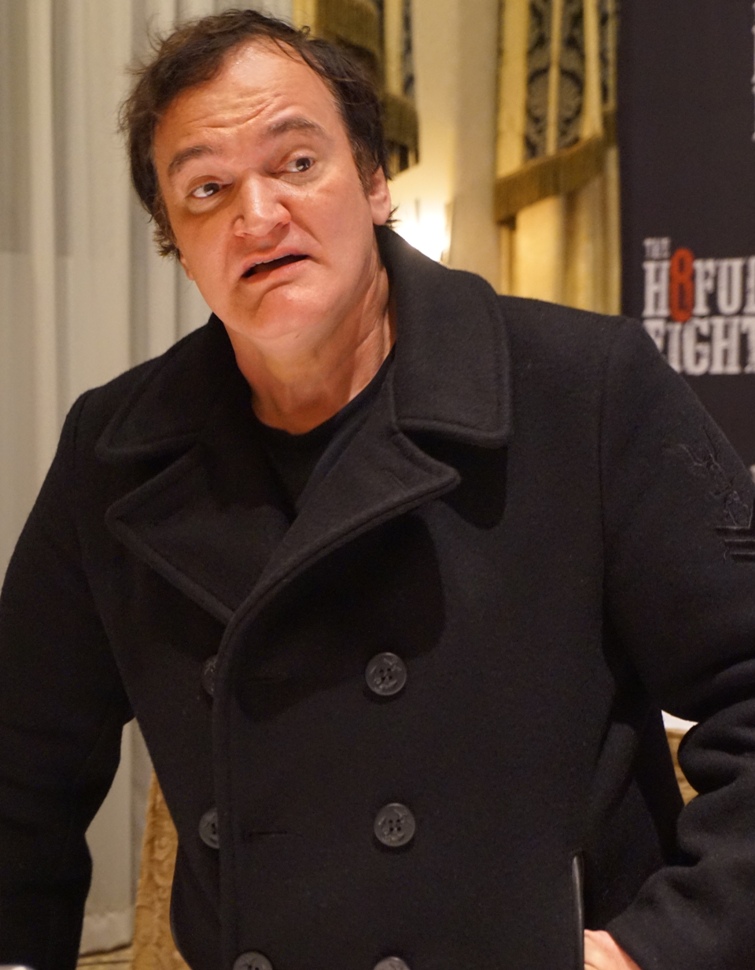 Iím curious in terms of content, going back to
the beginning weíve seen Western influences in your films. Clearly
Django operated in that genre.
This continues that among other genres kind of mixed in there, but itís
fair to say your sort of in a Western phase right now. Was this born out
of your experience on Django? Did that experience form this one?
Do you see them as linked?
Iím curious in terms of content, going back to
the beginning weíve seen Western influences in your films. Clearly
Django operated in that genre.
This continues that among other genres kind of mixed in there, but itís
fair to say your sort of in a Western phase right now. Was this born out
of your experience on Django? Did that experience form this one?
Do you see them as linked?
Quentin Tarantino:
Yeah, almost like these two characters, there
is a chain that connects Django to this one. I guess I am in a
bit of a Western period right now. Part of the idea was the fact that
normally Iíd been doing a movie in a genre that I know what I want to
do, but I donít know how to do it. Like, say, shooting the big martial
arts scenes in Kill Bill. You learn how to do it. I learn on the
job. I figure it out. Iím proud of it, but then I donít do another
martial arts movie. Same thing with the car chase in Death Proof.
In this one I learned how to do a western and I realized I wasnít done
with the genre. I wasnít done with what I felt I had to say.
One of the things I had to say in this regards
was a dealing with race in America, which actually a lot of westerns had
avoided for such a long time. I think I had more to say. There was also
something else about Django, too. Youíre dealing with such a big
subject, as far as slavery in America. As fun as Django was, it
was this downer sword of Damocles
hanging over the whole thing that you always
had to deal with. You had to deal with it in a responsible way. There
was actually an aspect of The Hateful Eight, even though I deal
with similar issues, I could just let it rip. Just do my western without
having this History with a capital H hanging over the whole piece.
For Kurt
and Jennifer, your characters are linked, sometimes physically by
chain, for extended periods of time. Can you talk about the pros and
cons, the challenges of that kind of working relationship?
Kurt Russell:
At first, when Jennifer and I started to
rehearse, we didnít really think there would be much of a problem with
the chain. We didnít think it would represent anything, either. Nothing
couldíve turned out to be further from the truth. Everything that we did
was formed by how that chain was dealt with. So we had to learn to get
the Fred and Ginger that held them together. (ed. note: dancers
Fred Astaire and Ginger Rogers were famous for moving around each other
rhythmically as one.)
So for me there was John Ruth and for Jennifer
there was Domergue. Together we were going to be this team. If youíve
been chained together for like a week and a half, 24/7, you get to know
a lot about that person. The Stockholm syndrome is going to set up
pretty fast. And it did. The fact is that over a five month period of
time, the Stockholm syndrome between Jennifer and I set up and it
informed everything that we did.
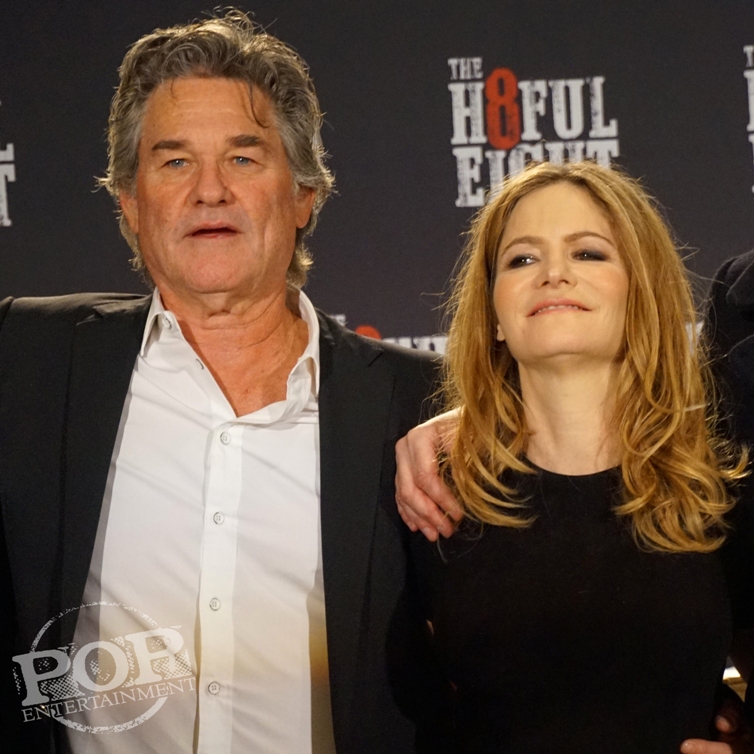 I canít recall a character quite like Daisy
that Iíve seen in a film, at least not for some time. Is it all on the
page or are the influences that Quentin mentioned or that you found
helpful for your approach at this character?
I canít recall a character quite like Daisy
that Iíve seen in a film, at least not for some time. Is it all on the
page or are the influences that Quentin mentioned or that you found
helpful for your approach at this character?
Jennifer Jason Leigh:
So much of it obviously is on the page,
because you are dealing with such a great script and such a great
character. With Daisy there is a lot that is mercurial and we had to
find. We wanted to find it together. So much of Daisy is informed by
John Ruth, because she is always reacting with him because of what heís
done. The chain. The hits. What mileage she can get from that. She
thinks sheís a lot smarter than John Ruth... and actually she is. She
feels like sheís playing him in a lot of the movie. Whatís so great
about doing a Tarantino movie, and whatís so great for all of us actors,
is that we are always being surprised by everything. Thereís a moment
where it all shifts where John Ruth isnít just a putz, a fool
that she is just so much smarter than. Heís suddenly very smart and very
dark when he goes and gathers all the guns from everyone. Then she has
to re-judge him, just like everyone else in the movie.
Everyone in the movie is terrible and hateful.
Everyone in the movie you also care for. They have their weaknesses, the
good part of them in a certain way. I just remember the day we shot that
scene, because Daisyís having a blast. I mean, yeah, sheís going to the
gallows, but she knows sheís not going to the gallows. Sheís going to
figure it out. But in that moment itís not so clear anymore. That was so
exciting as an actress, to not know that was coming. To read it on the
page and yet when I felt it happen in the room, I swear my blood went
cold. It was just a phenomenal experience.
Kurt Russell:
I just want to say one other thing. We havenít said this, but it was an
unspoken thing. This will be the first time sheís heard me say this.
Because of who John Ruth was, everything when that clapper goes bang and
itís action: That chain was mine. I own it. Because of that, I felt that
as soon as "cut," that chain was hers. We had to have a balance. Iíll
tell you something, I really appreciated what she was going through.
When you turned that chain over to the other person it wasnít easy.
Jennifer Jason Leigh:
Iím not as good a dance partner as you are.
Youíre a much better leader. Iím better at following.
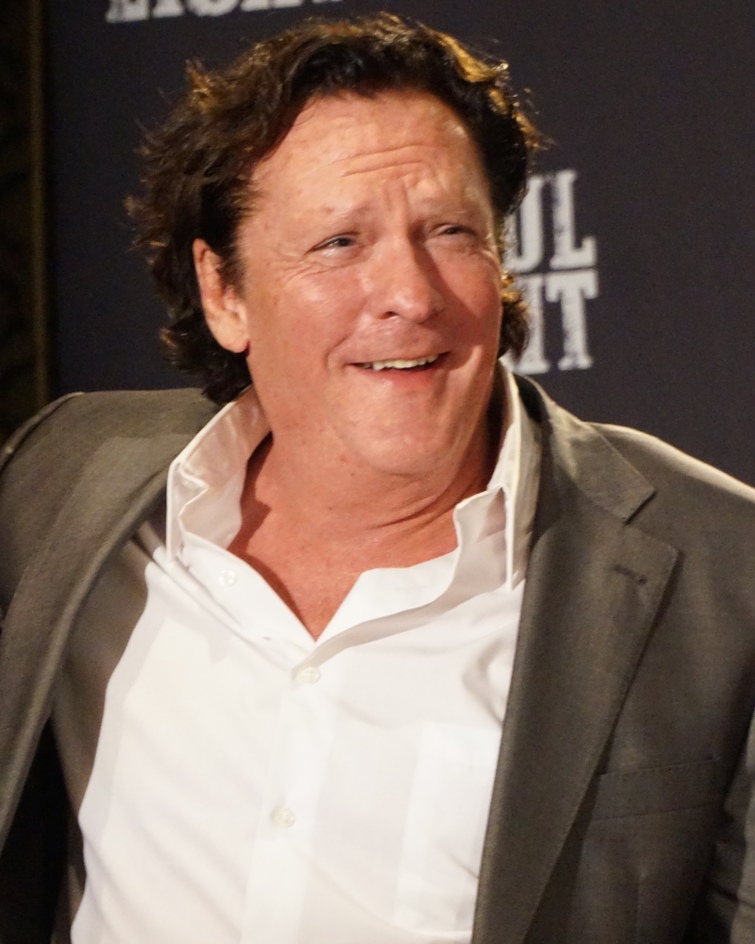 Among the actors here, a lot of your
characters are equal parts charming, ruthless and despicable. Do you all
consider yourselves the hero in a weird way of this story?
Among the actors here, a lot of your
characters are equal parts charming, ruthless and despicable. Do you all
consider yourselves the hero in a weird way of this story?
Michael Madsen:
I read a biography of James Cagney. He said
that if you play somebody whoís very noble, you should probably try to
find a mean streak in that person, or something dark that theyíre
carrying around. If you play somebody whoís very evil, you should
probably try to find something good in that person somewhere. Thereís
always a duality to what you do. The best thing about making a picture
for Quentin is that he lets your character have [that] duality, if
youíre capable of doing it. Heís the only person I know who can do that.
Michael and Tim, you both worked on Quentinís
first film Reservoir Dogs. For
you Tim, Iím curious did this experience feel like apples and oranges or
did it feel like pretty much what you remembered from that first
experience?
Tim Roth:
The man is the same. Yeah, I was around at the very beginning. Then I
had this huge break from working with him. So I did get to see in a
highly impactful way how his world has changed, how the set has changed.
For example, there was always a policy about music playing between set
ups. That serves the atmosphere that exists on this set. I had seen
that. Heís accrued so much more knowledge of cinema, and how to tell his
stories. So I saw a big difference. That was very exciting.
Quentin
Tarantino: Yeah well, in particular in the case of Reservoir Dogs,
along with the PAís, I was the least experienced person on the set. Tim
and Michael had both made a lot of movies by that time. I was just
getting through the process.
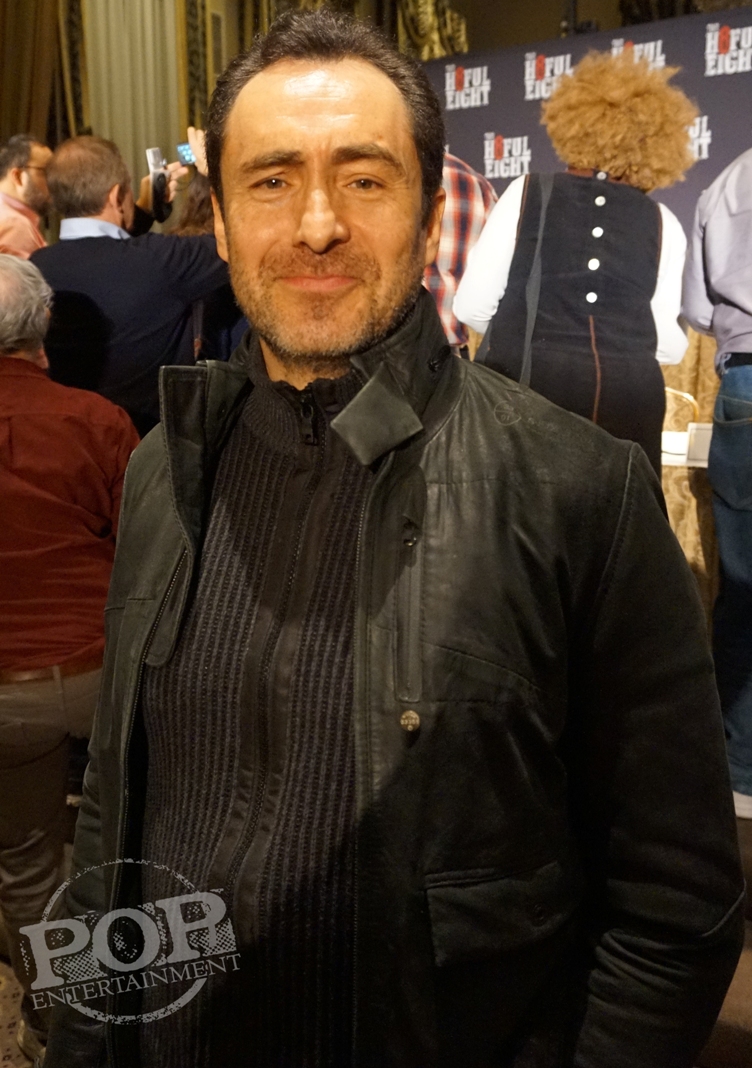 DemiŠn, you
have worked with some heavyweights. How is working with Quentin compared
to any other filmmaker youíve worked with?
DemiŠn, you
have worked with some heavyweights. How is working with Quentin compared
to any other filmmaker youíve worked with?
DemiŠn Bichir:
The first thing youíre curious about is how everythingís going to work
out. Not only because you have this huge directorís name in front of
you, but with this amazing group of actors. I remember the first time we
had this table reading. You always want to be able to one day say a
Tarantino line in a film, right? So I was very, very happy and excited
about it. Then to listen to every single line in the mouths and bodies
of all these fantastic actors, that was beautiful.
I remember that first reading that we had at
this hotel back in Los Angeles, going back home and telling my girl:
Everyone is so damn fucking nice. Because a small fish can be lost in a
big ocean unless they embrace you, unless they treat you well. The first
thing that made me very happy when I actually met Quentin was to find a
warm man. A very generous, loving man. The whole thing has been a
confirmation of what I thought always, the biggest artists are nicest.
For you Mr. Dern, youíve worked with [Alfred]
Hitchcock, youíve worked with [Elia] Kazan. Youíve worked with the
finest filmmakers in the history of the media. What are the connections
that you see between Mr. Tarantino and those?
Bruce Dern:
I have been very lucky in my career. But this
guy, he does a couple things the others Iíve worked with didnít do. He
has the greatest attention to detail Iíve ever seen. Burt Lancaster once
told me itís [Luchino] Visconti. [Tarantino will] take a seat by
Visconti, trust me.
The other thing he does is he gives you an
opportunity as an actor Ė and everybody behind the camera as well Ė a
chance to get better. The material is so good, so original, so unique if
you will, that the big part of it is that youíre so excited that he
chose you and not Ned Beatty or Jimmy Caan. (Everyone laughs.)
Youíre excited to go to work everyday. I had that with Mr. Hitchcock for
a few days. I felt it everyday with Quentin. Youíre excited to go to
work everyday, because he just might do something thatís never been
done.
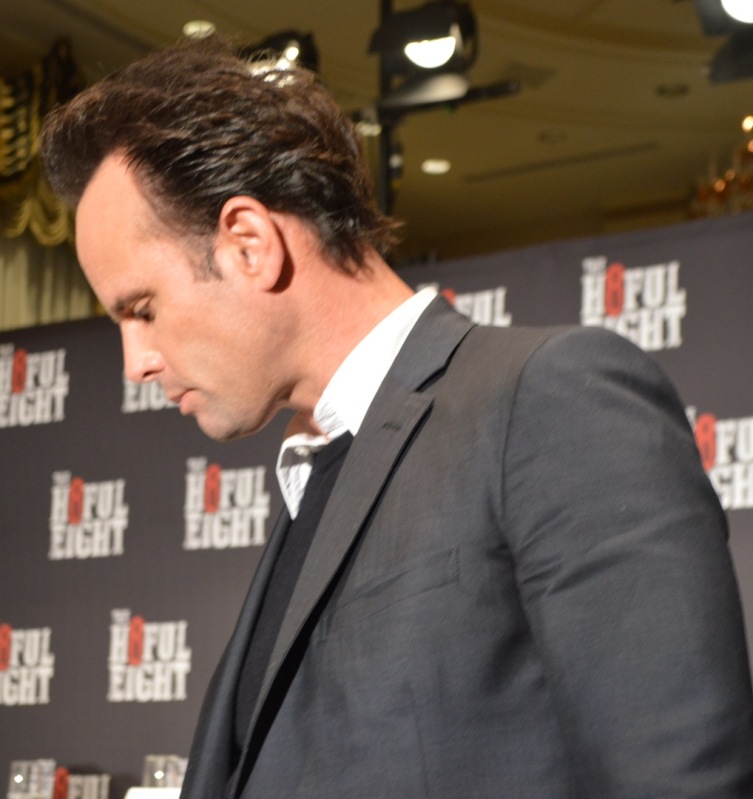 Walton, in Quentin Tarantinoís set, would you
ever suggest an alternate line?
Walton, in Quentin Tarantinoís set, would you
ever suggest an alternate line?
Walton Goggins:
Thereís no improv in this press conference. He
wrote everything that Iím about to say. (Everybody laughs.) No,
why? Why would you mess with perfection? We can say that, because it is.
Itís every actorís dream to get an opportunity to say a Quentin
Tarantino monologue, or a line of dialogue. There is no need to change,
even add an "and," or a "the," or a comma. It really is perfect, the
way that it comes out of his imagination.
There is a group calling for a boycott of this
movie. They donít want the members of the police unions across the
country to see it. Do you think itíll hurt your launch? Is there
anything you can say to put their mind at rest?
Quentin Tarantino:
Well, Iíve dealt with it in quite a few
different venues. I donít think I just need to keep reiterating that
aspect of it. Look, I hope that doesnít happen. I really do. Just
because some union mouthpieces are calling for a boycott doesnít mean
all the different officers on the street are going to necessarily follow
suit. I have to say itís kind of a drag, because the statements Iíve
made I believe are very true. I intend to go maybe further with that as
time goes on. Nevertheless, I think you can actually decry police
brutality and still understand that there is good work that the police
do. I think Iíve made that pretty clear.
I also do know that thereís a whole lot of
police out there who are real big fans of my work. I just hope that
theyíre not going to take Patrick Lynchís word for what I said. What I
said is what I said. You can actually look it up and read it. Iíve
actually clarified my comments since then. Not walking back at all, just
a little bit more clarification. I still stand by what I say. I think
thereís a lot of good cops out there and they should agree with what I
said, if theyíre coming from the right place. So I guess weíll just see.
You said you
were not done with westerns yet. Will your next film also be a western?
Quentin Tarantino:
Weíll see. Actually, the third western could
be a TV thing. Iíve owned the rights for a while. I get them and I lose
them and I get them and I lose them. Thereís something about the piece
that demands that I make it. Thereís an Elmore Leonard book called
Forty Lashes Less One. I actually think if you want to call yourself
a western director today, you need to do at least three westerns. I mean
back in the 50s it would be like 12, but in todayís itís three. I mean
if you really want to put your westernís on the shelf with people like
Budd Boetticher, Anthony Mann and [Sam] Peckinpah and stuff.
I would really like to do Forty Lashes Less
One as a mini series. Like hour episodes. Iíd write it all and Iíd
direct it all, but maybe itís four or five hours, something like that.
If youíve ever read the book, it would fit right along the lines of
Hateful Eight and Django. It deals with race. It all takes
place in Yuma Territorial Prison. Itís a really good book and Iíve
always wanted to tell the story. So, weíll see. Iím hoping Iíll do that
eventually.
Even though it was for TV, would you shoot on
film?
Quentin Tarantino:
Oh yeah, absolutely. Iíll never shoot on
digital.
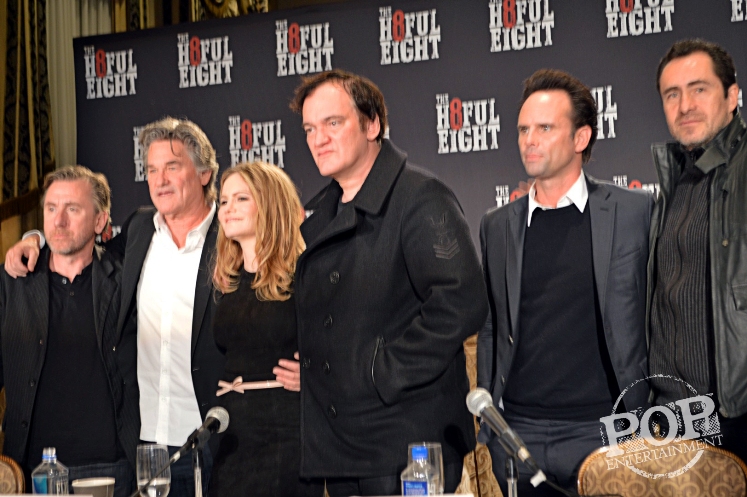 Tim, did you see any similarities between
God of Hell and your character?
Tim, did you see any similarities between
God of Hell and your character?
Tim Roth: I
think just the duplicitous nature of the character. Thereís a similarity
of that. Thatís interesting. I havenít thought of that [film] in a
while.
Where did you come up with the idea of doing a
closed country house murder mystery as a western?
Quentin
Tarantino: I just thought it would be a good idea for the story. I
thought it would be very interesting. One, the story just kind of lent
itself to it at a certain point. Also, frankly, it was just I
like mysteries. They havenít done mysteries in a long time and I think
theyíre just very entertaining. I didnít know exactly what was going to
happen, at least in the first draft of the script. As I was going, I
just dealt with everything as it went. Iím writing the stagecoach part
and thatís just that. Then we get to Minnieís Haberdashery and thereís
four people waiting. I didnít even know who those four people were. I
wanted to be as in the dark about them as the audience would be Ė and as
the characters in the stagecoach would be Ė and just have the reveal
themselves to me little by little by little.
Then by
introducing that mystery aspect, I just thought that would be a lot of
fun. Like I said, I think that especially when you havenít seen a
mystery done at the movies in a long time it could be a really
entertaining experience. I remember after I gave Sam Jackson the first
draft of the script, I go to him and go: So whatís your favorite part of
it? He goes, "Well, I like when I start figuring shit out and I turn
into Hercule Negro." (ed. note:
That was a play on the name of Agatha Christieís detective character
Hercule Poirot.) Thatís what we called that character through the whole
shooting. (laughs)
Since this has been such a love fest, can you
talk about how you developed the animus among you actors? What did you
do to up
the tension and anger and nastiness?
Quentin
Tarantino: Itís just in
part and parcel to the material. This
was the case of Reservoir Dogs, too. Thereís a similarity to this
and Reservoir Dogs, to some degree. I donít think I even
understood the dramatic structure and one of the reasons why
Reservoir Dogs worked so well when I wrote it and did it. After
hearing people talk about it, I kind of figured it out. Since then Iíve
worked on that same principle. Like, in particular, the basement scene
of Inglourious Basterds. Now itís something I do. I believe that
suspense can be like a rubber band. You just keep stretching that rubber
band. Using the basement scene as an example, that best scene could be a
five minute scene, or a six minute scene or a seven minute scene and
that would be good. If I can stretch that rubber band to 25 minutes and
it still holds, it doesnít snap, well then it should be better.
Iím taking that very idea to its conclusion by
making a movie this long. If that rubber band doesnít stretch, maybe
itís kind of a boring movie. Part of whatís going on, part of that
rubber band is the threat of violence. That is just hanging over the
movie and hanging over the characters. Violence doesnít even need to
happen, but youíre prepared for it to happen. You donít know where itís
going to come. You know itís going to be horrible whenever it does. But
exactly when and how and who, youíre not so sure. Frankly, if I donít
pull that off and if these guys donít pull that off, then maybe the
movieís not so good. Maybe itís going to be dull. So Iím betting weíre
pulling that off.
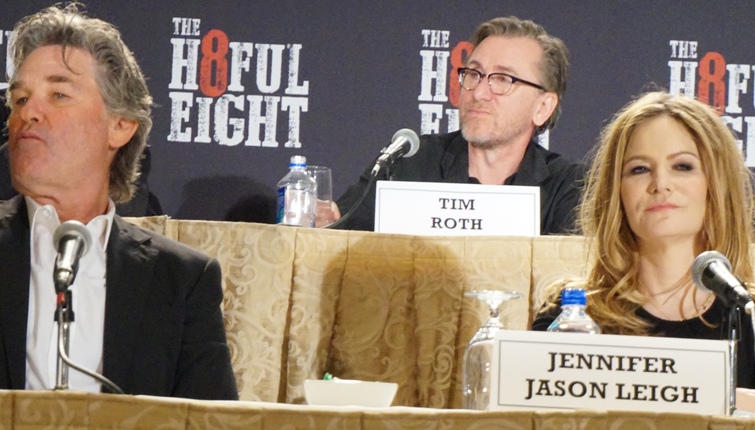 Kurt Russell:
John Ruth carries that ball. Heís the only one that carries that ball.
The rest of them are pretending to be who theyíre pretending to be,
whoever that is. I think the most extreme example of it actor-to-actor
is in all honesty when I am going to walk over and talk to Michael
Madsen. Heís Mr. Blonde (ed note: Madsenís character from
Reservoir Dogs) and Iím Snake Plissken (ed note: Russellís
character from Escape From New York).
Thereís going to be some fucking
problems. Michael is a fantastic energy. Heís a force as a human being.
Iím more of just an actor. Iím not Snake Plissken. Not anymore. But I
didnít want to let Mike down or let Quentin down. Youíre going to carry
that with everybody.
Kurt Russell:
John Ruth carries that ball. Heís the only one that carries that ball.
The rest of them are pretending to be who theyíre pretending to be,
whoever that is. I think the most extreme example of it actor-to-actor
is in all honesty when I am going to walk over and talk to Michael
Madsen. Heís Mr. Blonde (ed note: Madsenís character from
Reservoir Dogs) and Iím Snake Plissken (ed note: Russellís
character from Escape From New York).
Thereís going to be some fucking
problems. Michael is a fantastic energy. Heís a force as a human being.
Iím more of just an actor. Iím not Snake Plissken. Not anymore. But I
didnít want to let Mike down or let Quentin down. Youíre going to carry
that with everybody.
That was challenging
for me. That wasnít easy, with my personality, to go over and just be so
bombastic and seriously confident. It was my first experience in a long,
long time to relish working with actors that all I had to do was talk to
them. Listen, Iím just going to be my guy. I donít have to do anything
for them, donít have to pull for them as an actor. You guys know what
Iím talking about? When you start pulling for another actor, like: Come
on, man, come on, bring it. Youíre like: oh, come on! You could just go
hold your own and go do your thing. That was exciting as hell. That was
awesome to do that with every character and every actor in this. These
guys are great.
Quentin Tarantino:
That was one of those things. We did a
three-day rehearsal before we did that script reading. I wrote John Ruth
for Kurt. I wrote Joe Gage for Mike. The first time they got to that
scene and we read that scene, it was just like: Oh, woah! Snake Plissken
is challenging Mr. Blonde. Holy shit!
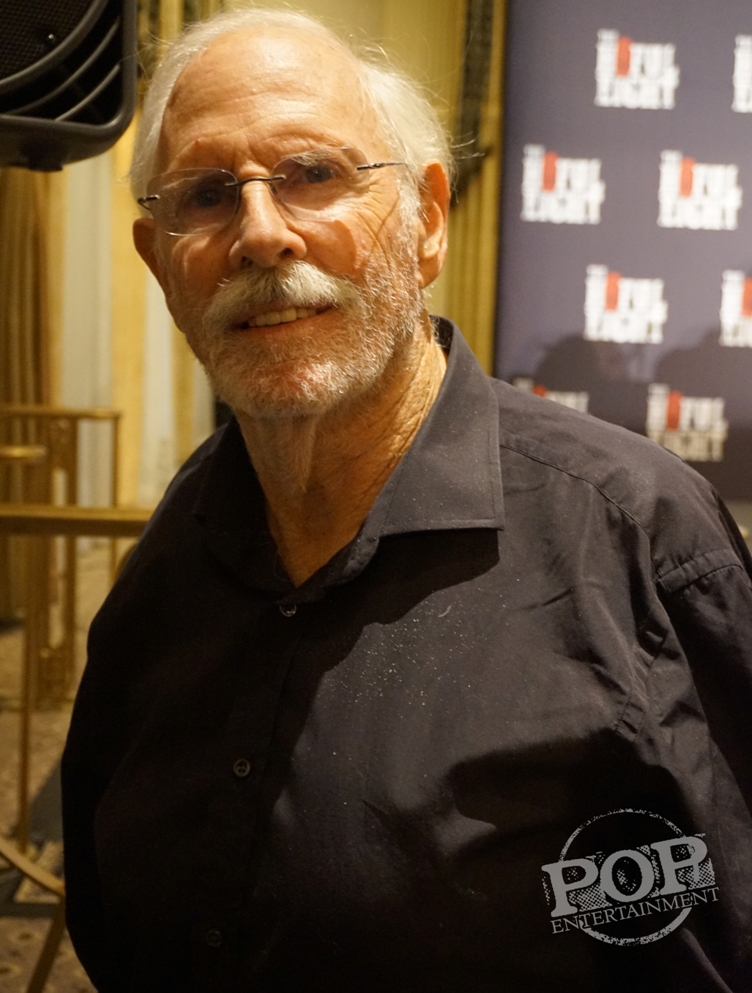 Bruce Dern:
Thereís one thing I want to say. The man obviously has a magnet. What
the magnet does to actors is youíre so drawn to him. My main reason why
is his reverence for what went before. His respect for the industry is
just mind boggling and he means it. If you dare question him, he will
put you in your place and tell you facts about stuff you never even knew
was made. That was a delight for me. Thereís that kind of thing you
donít get very often.
Bruce Dern:
Thereís one thing I want to say. The man obviously has a magnet. What
the magnet does to actors is youíre so drawn to him. My main reason why
is his reverence for what went before. His respect for the industry is
just mind boggling and he means it. If you dare question him, he will
put you in your place and tell you facts about stuff you never even knew
was made. That was a delight for me. Thereís that kind of thing you
donít get very often.
Kurt Russell:
To speak as well just really quickly, Quentin also visually takes you
through an experience as an actor. The sequence of shots that comes out
of his imagination, it allows for this strange kind of adjustment. Itís
like this improvisation physically with the written word that you just
donít anticipate. You donít want to have the right answers. It could go
anywhere. One experience for me in particular was the dining room table.
Weíre sitting at the dining room table and have this rather innocuous
conversation with Chris Mannix (ed note: Gogginís character) and
Domargue. Weíre just back and forth. Then with Tim, with Oswaldo.
Then something
happens in the movie and he comes back. He sits down at the table. But
what Quentin had me do was just so fucking cool. There was a bowl here.
I come back. I pick up the bowl. I just take it without any explanation,
no commentary and sit down at the end. Before anything comes out of my
mouth, the way that you told that story, you know heís about to stir the
pot. Itís about to go here. Literally three sentences in to Major
Warren, Sam knows exactly where itís going. I had no idea he was going
to do that. It just happened for everybody at the table except for him.
That was just Quentin you know.
How difficult and/or easy was it, or how
important was it for you to get Ennio
Morricone
to score this film?
Quentin
Tarantino: It was a dream. It was a dream.
We had made overtures towards working with each other the last couple of
movies, in particular Inglourious Basterds and Django.
They never quite worked out per se, because of the timing and
schedules. Also thatís not really how Iíve ever done it before. So maybe
Iíve always had a little trepidation to do it that way, even though I
would explore it. But it just didnít happen. With this movie, I just had
a little voice. I had a little voice in my ear that said this movie
deserves its own score. I take nothing away from the other movies that
Iíve done using other scores. I think that those are right for them. I
didnít hear that voice then and whoever uses it best gets it, as far as
Iím concerned. But in this one I just had this little voice. This
material deserves its own theme, its own piece of music that is its own
personality.
He was very interested and so I took the first
step. The first step was actually just translating the script into
Italian and sending it to him. We sent it to him and he read it, and his
wife read it, and his son read it. They all liked it. His wife really
liked it. I think that went a long way. Then we got together. I went
down to meet him in Rome and went to his lovely, beautiful apartment,
maybe the greatest apartment Iíve ever seen in my life. We were there
talking about it and I go: So what is it you see, or hear? He goes,
"Well I have this idea for a theme and itís..." He didnít hum it or make
his sounds and stuff, he goes, "I just see this like driving, driving
forward. Itís like the stagecoach moving through the snow, moving
through the snow, moving forward moving forward. But it also is ominous
sounding and suggests the violence that will come."
At first, because he didnít think he had time,
he was only going to write one [song]. Just the theme and that was it. I
ended up seeing him the very next day at the Donatello Awards, and he
goes, "Iím going to write you more. Iím going to write more." So
literally seven minutes of music became 12 minutes of music, became 22
minutes of music, became 32 minutes of music. I think he sat down and
just got inspired. The way it worked though Ė and again heís cool this
way, because he wants to keep it the way youíre used to. He actually
didnít see the movie until in London just the last couple of days, so he
didnít so he didnít score to scenes or anything. He just scored to this
script.
He wrote a couple of pieces of music that he
thought could be really good for the material itself, but not scene
specific. About three suites like that, and then some other music that
he thought I could use for emotions. He gave it to me based just on the
script and let me take it and put it into the movie the way Iíve always
done before. It ended up being a very, very lovely encounter. Now Iím
looking forward to having him do the score before I even shoot the
movie, so we can actually really get down to it. Itís become a lovely,
lovely relationship. I kind of cherish it actually. Not kind of cherish
it, I do cherish it.
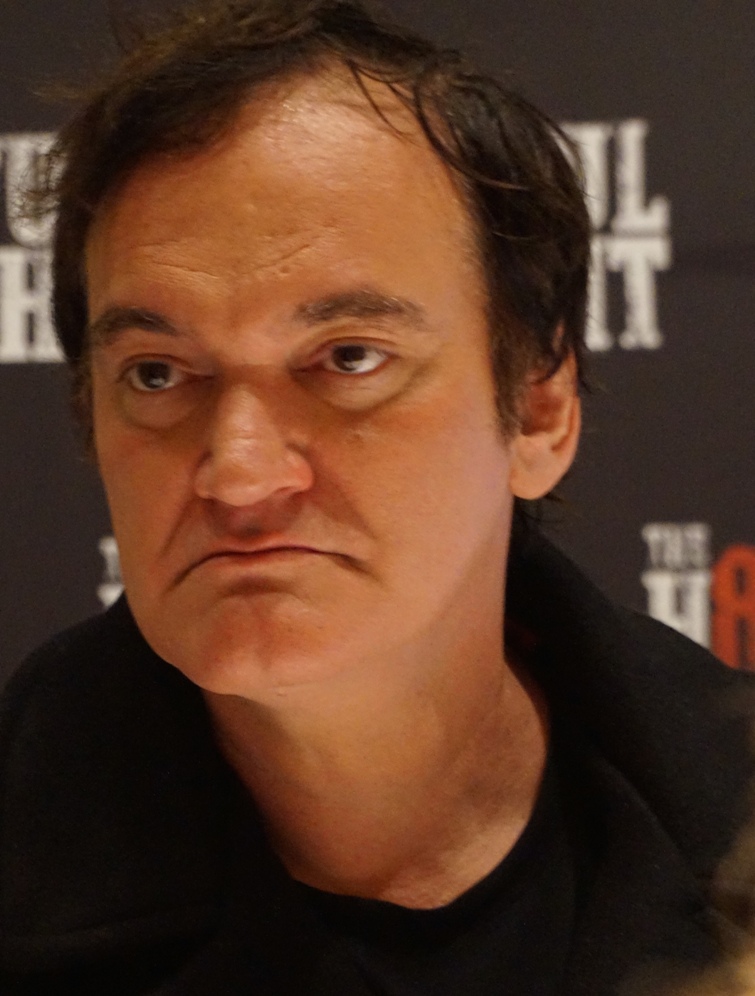 You mentioned a live read earlier. You had
this experience getting an audienceís response to the script before it
committing it to film. Did you alter anything based on that?
You mentioned a live read earlier. You had
this experience getting an audienceís response to the script before it
committing it to film. Did you alter anything based on that?
Quentin
Tarantino: We altered a lot, because it
was only the first draft. One of the things about the movie is I wanted
to do three different drafts of the film. This live read was just from
the first draft. Which was different from what I normally do. Normally,
I write these big, long, unwieldy novels. Thereís the beginning and the
middle. The middleís always great because now youíve committed to
writing so much. You know more about the characters than you ever could
before you start writing. Then thereís the end. By that point, the
characters have just taken it, so they always dictate the ending, to me.
Iím doing genre movies, so I have an idea
where Iím going at the end. Like at the end of Kill Bill, I
thought it was very possible she would kill Bill. (everyone laughs)
But how, why, exactly how you feel about it: that was very open to
question. Thatís one of the reasons that I like genres, because I can
explore a lot of different things, but still have a road that Iím
travelling, to some degree or another. This one I wanted to do
differently. I wanted to spend time with the material. More time than I
normally spend Ė i.e. from the beginning, middle and end.
I wanted to even go through the process of
telling the story three different times. Just to give you an example, in
the first draft, the Lincoln letter Ė which is a motif that plays out
through the film Ė was only dealt with once. It was in the stagecoach. I
knew I wanted to do more with it, but I wasnít ready. I didnít have any
obligation to do it in the first draft. I could find it on my own. Then
in the second draft, it appeared at that dinner table scene. In the
third draft, it appears later. the way you see it in the movie.
Just to give you another example, Daisyís end
in the third draft is what is in the movie. [It] was where I thought I
wanted to go in the first draft, but something stopped me from going
there with her in the first draft. I almost felt I didnít have the right
to do that to her yet, because I didnít know her well enough. Not by
just the first draft. I wrote the whole second draft from Daisyís
perspective. Just emotionally, not in a tricky pros way, just in an
emotional way, so I could really get to know her. I wanted to be on
Daisyís side for an entire draft of the story, so I could really feel I
knew her. Then after I felt I knew her, I could do what I needed to do
to her in the third draft. (laughs)
Some critics are calling
The Hateful Eight a horror film. Do you agree with that?
Quentin
Tarantino: It was really interesting. Me,
Tim, Walt and Kurt just got back from the press and the premieres in
London and France, and Mad Movies, which is sort of like the
French Fangoria, theyíre not the first people to it bring up:
"Hey is this your first horror film?" A couple people had brought it up.
There are definitely horrible moments in it to be sure, but it was
surprising how it was a theme in France. I mean every interviewer came
in, (uses French accent) "Itís a western, but horrific." They
really kept hitting on this horror film aspect.
That actually does to some degree or another
play into it. I donít think this is that influenced by that many other
westerns, but one movie itís definitely influenced by is John
Carpenterís version of The Thing, which also had Kurt Russell and
also had a score by Ennio Morricone. Now
that actually makes sense, because this movie is very influenced by
Reservoir Dogs and that was influenced by The Thing. I mean
thereís obviously trappings of the characters trapped in one room.
Thereís a lot of paranoia going around. Nobody can trust anybody.
Thereís a horrible blizzard going on outside.
But the biggest influence
when it came to that was the effect that The Thing had on me the
very first time I saw it in a movie theater, on opening night. I think
that was actually the first time I could break [a movie] down in a more
critical way. The effect of a film Ė i.e. the paranoia was so
strong between those characters. It was trapped in such an enclosed
space. The paranoia just started bouncing off the walls, until it had
nowhere else to go but through the fourth wall and into the audience.
That was the effect I was going for with The Hateful Eight, to
have that kind of feeling.
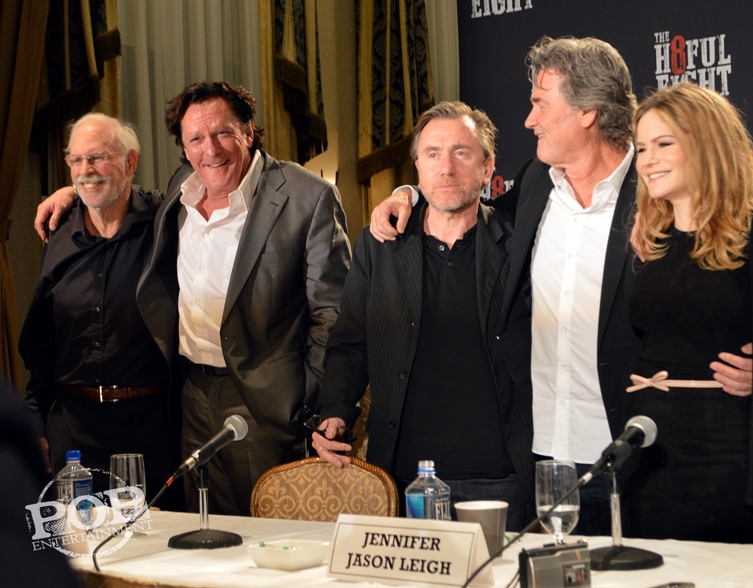 In the music, the overture
suggests an Italian horror film.
In the music, the overture
suggests an Italian horror film.
Quentin
Tarantino: Oh
absolutely. Thatís for damn sure. I didnít expect Ennio to give me a
western score. I think a movie with Terence Hill called A Genius
in 1973 or í74 was his last official western score. He always said he
didnít want to do westerns anymore. So even though this was a western, I
wasnít expecting a score similar to like Two Mules for Sister Sara
or anything like that. I was figuring it was going to be dark.
Thatís the way he
described it, but he gave me a horror film score and sometimes even a
giallo score. (ed note: Giallo is a 1960s & 70s Italian
horror subgenre.) Thereís even elements of a giallo score in
this. Giallos are usually mysteries. Thereís even a black glove
killer in my movie. Itís one of those things where you see the killer
with the black glove. Itís like, okay, I canít wait for them to show
more of the characters so I can see who wears a black glove. Then, oh
shit, everybodyís wearing black gloves.
Jennifer, in terms of
building up violence and tensions, you mentioned a little bit before
about playing a character who had several dimensions to it. Daisy wasnít
100% rotten. Where did you find your sympathy with her? Was it just that
she dealt with rough, hateful men her whole life?
Jennifer Jason Leigh:
No, actually.... Youíve all seen the movie, so I guess I can give stuff
away...
Quentin
Tarantino: No, no, no, not so much, because theyíre going to write
about it if you tell them. (laughs)
Jennifer Jason Leigh:
Iíll just say that Daisy has very strong loyalties. I think she has a
very good heart. I think she has a big heart and a good heart. I do feel
that about her, I mean as crazy and wicked evil [as she may be]...
(Everyone else laughs, disagreeing.)
Quentin
Tarantino: I really do
not agree. Thatís her job to feel that way...
Michael Madsen:
Sure...
Quentin
Tarantino: Well but in
that same vein, I will point [something] out and Iíll say it so you guys
can print it and I donít ruin any of my surprises. Iíll talk a bit in
code, but if youíve seen the movie, youíll get the code.
Thereís these killers in
the movie that do some horrible murders and you see it. You absolutely
see these murders. Itís one of the more horrific parts of the film. At
the same time, theyíre the only people that do anything for anybody else
in the whole movie. They do it for her. As far as theyíre concerned, if
they have to kill every son of a bitch in Wyoming, thatís what Wyoming
gets for trying to hang her. So there is that dichotomy in every
character and every situation that happens. There also is on the other
hand. You might think the other hand is bullshit and not worth it, but
there is another hand.
I thought Daisy was more
like a tarantula getting ready to strike.
Quentin
Tarantino: Where I was coming from when I actually wrote her, things
evolve as she goes on, but to me she was like a Manson girl out west. My
starting off point was Susan Atkins.
Did you have
The Magnificent Seven in mind?
Quentin
Tarantino: Not really. The thing about The Magnificent Seven,
Iím thinking a team working together. This is just that in title, not
execution.
Have you
thought about doing horror? I thought Death Proof was something
of a horror film.
Quentin
Tarantino: I donít know. Death Proof is my little
deconstruction on the slasher film genre, so absolutely. But I donít
think I have the right temperament to do something like say, The
Exorcist. Thatís all about one tone of dread that carries through. I
just like breaking them up a little bit. If I were to do a horror film,
it would be something like that, but I donít think I have the right kind
temperament. I like going up and down and up and down. I think that may
take away from the horror.
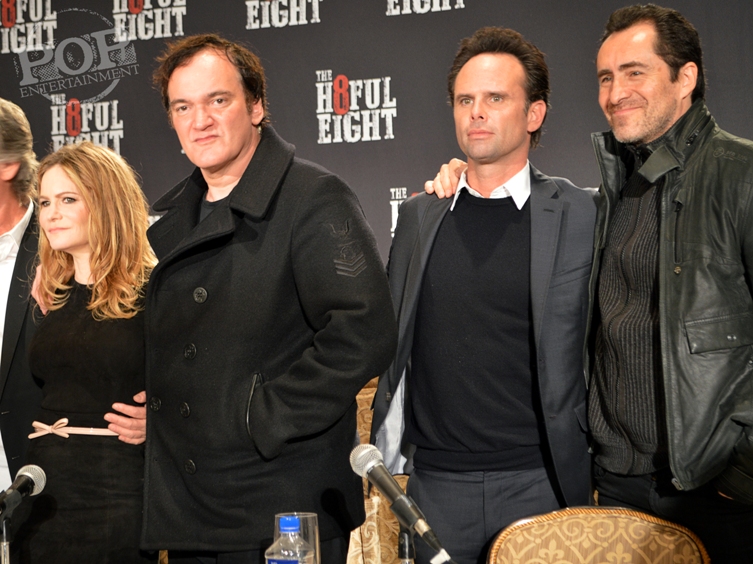 What genre
would you like to try next that you havenít done yet?
What genre
would you like to try next that you havenít done yet?
Quentin
Tarantino: It could be fun to do like a 30s gangster movie, like a
Bonnie & Clyde or Dillinger. The guys with Tommy guns and
stuff. Thatís something I havenít done. That would be cool.
Just quickly about the
70mm. The format is glorious and you can see immediately how it changes
the views from the outside. What challenges were there maximizing the
inside shooting in the smaller set?
Quentin
Tarantino: To me it
helps everything out, especially when youíre in the situation where you
always want to keep track where the other characters are. I guess thatís
kind of setting up that chess board to one degree or another. With
somebody like [cinematographer] Bob Richardson, who lights it fairly
well, I love the compositions. I thought that part wasnít hard at all.
The only difficulty was I had gotten used to using a zoom and we
couldnít get a zoom for it. But thatís actually kind of cool, because
maybe Iíve been relying on it a little too much. You definitely canít
use a steady camera with it, so we used a crane like it was a steady
camera. (chuckles)
Where does your
inspiration from all of this come from?
Quentin
Tarantino: It was
actually kind of funny because both Bruce Dern and Kurt Russell were in
a lot these. Iíve watched a lot of episodic western shows from the 60s,
like The Virginian, High Chaparral and Bonanza and
stuff. I found myself watching the episodes that had really cool guest
stars in it, like James Coburn, or Robert Culp, or Vic Morrow (ed
note: Morrow was Jennifer Jason Leighís father). People like that. I
noticed that when you watch those episodes, if Robert Culp was a guest
star, the story was about him. If he was on The Virginian, the
story was about him, not Doug McClure. Doug McClure knew him and was
helping him, but the same thing kept happening. Claude Akins, all of
them.
When it was a special
guest star, they were always strangers. They came into town. You never
really knew who they were. Some past about them was revealed at some
point in time, and how true or not true it was, you had to watch the
whole episode to find out. Oftentimes you never knew if they were a bad
guy or a good guy until the end of the episode. You didnít know if Doug
McClure was going to end up being a friend or end up killing him. A
little part of me thought, those are really interesting characters, what
if I took eight characters like that and trapped them in a room? But no
Michael Landon, no Little Joe, no Doug McClure, no Trampas. No good guy,
no hero, no moral center that the audience could move towards. Just let
those characters hash it out. That actually was the starting point.
Thatís what got me to sit down and put pen to paper.
Itís so challenging to
shoot winter, why did you decide to set it then?
Quentin
Tarantino: Well, I
havenít spent that much time in the snow in general. The snow western is
its own little subgenre unto itself, with Andrť De Tothís Day of the
Outlaw or Sergio Corbucciís Il grande silenzio. Theyíre very
bleak and pitiless movies. Also, with the idea of shooting 70mm, the
mountains, the blizzard, the snow and especially that stagecoach moving
through it would give it a big visual look. Even when youíre inside, the
outside is always going on. To me, the blizzard is like a monster in a
monster movie. Itís always outside. Itís raging, truly raging. Itís
angry and itís waiting to devour the characters if ever they leave.
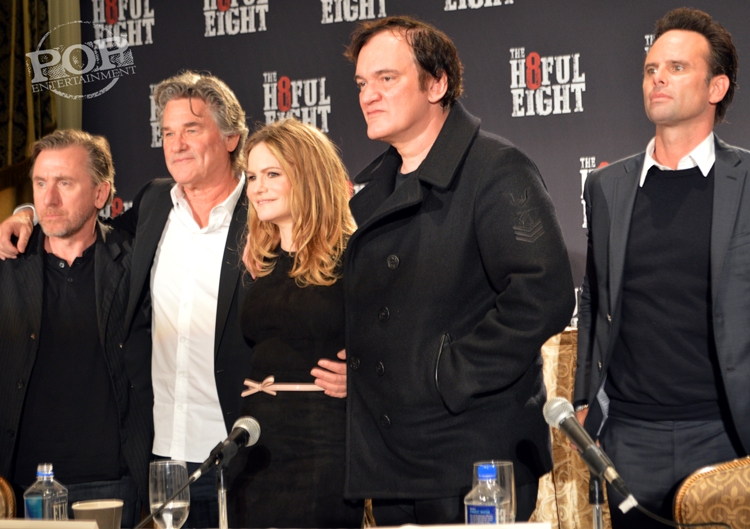 This is the sixth film
youíve done with Sam Jackson. As a director whatís your opinion on how
he has evolved as an actor from when you started working with him? Also,
if you were casting this movie 15 years ago, would his character have
been quite as large? How would that dynamic be different, if you think
it would be different?
This is the sixth film
youíve done with Sam Jackson. As a director whatís your opinion on how
he has evolved as an actor from when you started working with him? Also,
if you were casting this movie 15 years ago, would his character have
been quite as large? How would that dynamic be different, if you think
it would be different?
Quentin
Tarantino: Thatís
actually interesting, because I think when Sam came out of his motherís
womb the doctor said, "Mrs. Jackson, you just gave birth to a two-pound
baby actor." I donít know if Sam has gotten to become a better actor as
time went on, because I think he was always really great. But his
stature has risen and his persona has become bigger and bigger and
bigger. I love him because nobody says my dialogue quite like the way
Sam Jackson does. The dialogue is not poetry, but itís poetic, itís not
song, but itís musical Ė and he sings it. He gets that across in it.
Itís not stand up comedy, but it has a comedic rhythm and he nails that
fairly well.
Also, both me and Sam are
huge Lee Van Cleef fans, so there definitely is this tip of the bat
wings to Lee Van Cleef in his characterization. Even the way we did the
look. Itís interesting you ask that Ė I donít know about 15 years ago. I
thought, especially using that Virginian idea that I was talking
about, I speculated if I was doing this movie in 1969, who would I cast
as some of the different characters? I could see some of them. I
couldnít figure out exactly 100%. I could see Claude Akins as John Ruth.
Heíd be a great John Ruth. I could see Bruce Dern as Chris Mannix. I
could also see Bruce Dern as Jody to tell you the truth. Vic Morrow as
Jody, I think he would be terrific. I could see Robert Culp as Joe Gage.
And frankly if I was casting in 1969, I would probably cast Bill Cosby
as Major Warren. (laughs)
About the contemporary
cowboy songs, and newer musicians scoring westerns Ė Iím thinking Bob
Dylan in Pat
Garrett and Billy the Kid and Leonard Cohen with McCabe and Mrs.
Miller. What was your thought process with the Jack White song and
selecting the contemporary songs?
Quentin
Tarantino: Well
something about that song. I had another song in mind all through the
shooting, but this was literally a song that somebody gave me on a mix
tape back at the time that I was doing Kill Bill. All of a sudden
it just hit me. I started playing it and I really liked it. Itís done
with the kind of instruments that doesnít make it anachronistic, so it
didnít break you out. Itís not like putting in Metallica. It fits in.
But I also like that fact that it actually played like an interior
monologue of Daisy. It makes that sequence Daisy's sequence.
Is there some "Pirate
Jenny" in there from
A Threepenny Opera?
Quentin
Tarantino: Oh, I hadn't thought about that before, but I will take
any Brechtian reference you want.
Is it
literally Daisy's theme?
Quentin
Tarantino: No, but if
you listen to the lyrics in association to where Daisy is thinking at
that point in time about somebody coming to rescue her, basically itís
the Domergue clan talking to her. "Donít worry honey, itís rough, itís
tough, but weíre cominí to get you baby, weíre cominí to get ya."
Can I quickly ask you
about old screenplays that youíve maybe not quite released? I remember
when you wrote
Inglourious Basterds, you started way before it came out. And you
wrote this really, really, really long thing that became different.
Would you ever release the original version that you wrote back in the
90s?
Quentin
Tarantino: Yeah, well
we published Inglourious Basterds. The thing is though, the huge
stuff that I took out would make its own movie. It followed a bunch of
black troops that were court-martialed. They were going to be hung. They
were in France and they were going to be hung in London. They escaped
and their whole thing was trying to get to Switzerland. They ended up
getting caught in an adventure. They meet the Basterds and everything. I
ended up taking all that out. So I could still do that. They were called
The Killer Crows. Iím not done with it. Thatís the closest thing that I
have a big piece of material that hasnít been done before. I would still
need to end it and relook at the whole thing again, but that could
happen.
Did the film turn out
ultimately how you envisioned when you started months or years prior to
shooting?
Quentin
Tarantino: Yeah, the
answer is absolutely, but also the movie needs to become the movie. You
need to make it. When Iím thinking about it in my room, even when Iím
writing for Kurt Russell, then thereís actually working with them. They
all pull it together. You want the movie to have its own personality as
it goes and Iím very happy that it did that.
Do you enjoy the post
production process? How does it compare to the production part for you?
Quentin
Tarantino: To me, itís
always a situation where the writing process is fantastic. I love that.
Thatís my favorite part, when Iím doing that. Then just as Iím getting
tired of it, sick of it, Iím done with it. I donít really like
pre-production because I want to get into it right away, but then I
start shooting and thatís fantastic. And just as Iím getting sick of it,
usually, weíre wrapping it up. Same thing with editing. Now thatís my
favorite process as Iím doing it. Then just as Iím getting sick of it,
weíre done. I like the sound mix. I like the color timing. But those
three Ė writing, shooting and editing Ė those are my favorites.
Harvey Weinstein said that
this is your most political movie to date, do you agree?
Quentin
Tarantino: I do think
it is my most political movie to date. I donít know if that was what I
was thinking about as I sat down with a bunch of pieces of paper and
just started putting the pen to it. But it became that. I remember when
it really came to me was when Warren and Chris Mannix have their
"political discussion," to put a name to it, in the stagecoach. When I
finished writing that, I was like: Oh wow, this is kind of relevant to
today. This is almost a blue state/red state western kind of deal.
I thought that was
actually kind of neat, because one of the things about westerns is they
really, really reflect the decade in which they were made. If you look
at the westerns that were the most popular in the 50s, they really
reflected an Eisenhower ideal and this perceived sense of American
exceptionalism and prosperity. Of us thinking we won the World War II by
ourselves and then the whole rise of the suburbs and the supermarkets
and all that. So that was that, but then if you look at the westerns of
the late 60s through the 70s, that was a very cynical time in America.
It was a very jaundiced time and the westerns reflected that.
In the movies of the 50s
we lifted up characters like Wyatt Earp, Jesse James and Billy the Kid.
Then in the 70s we tore them down and showed them for what they were.
That almost vindicated our own cynical views of America. That just tells
you what the 70s were like. They deal with Vietnam. They deal with
campus unrest. They deal with Watergate. Bruce Dern did a movie called
Posse, directed by Kirk Douglas, that is a Watergate western in
every way shape and form.
So that blue state/red
state thing, I thought, oh wow! It made me think that maybe Iím doing a
good job, because Iím connected to the zeitgeist. Nevertheless,
after the script was over and we started shooting, the events that had
been happening in the last year and a half that weíd been watching on TV
just made everything seem more relevant to what we were doing to a
degree that maybe we didnít realize when we started.
I just want to ask you
about Fred Raskin and the editing.
Quentin Tarantino:
Oh, Fred is great. Heís my new man.
It was one of the tragedies of my life to lose [longtime editor] Sally [Menke]
the way I did. (ed note: she died from excessive heat after
getting lost while hiking in 2010.) [Fred] was an assistant on
Kill Bill. I didnít want to start working with somebody I didnít
know before. We worked on Django and we got together great. Then
I worked with him on this and it was just a joy. It was a joy and a
dream. One of the things about him that I just love is he gets my
material Ė i.e. he laughs and smiles at the same lines again and
again and again, no matter how many times we hear it. Iím always
laughing and smiling, so you could work for four months with the guy and
he laughs at the same jokes every single time it plays and smiles at the
same jokes every time it plays. You canít ask for any more than that in
an editor.
CLICK HERE TO SEE WHAT DEMIŃN
BICHIR HAD TO SAY TO US IN 2014!